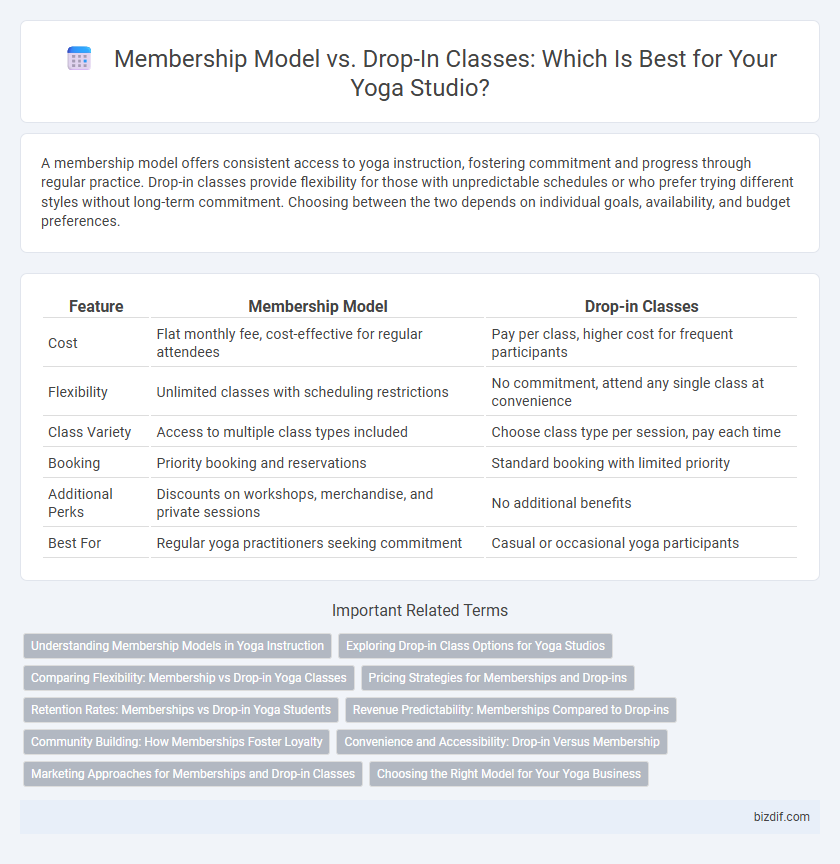A membership model offers consistent access to yoga instruction, fostering commitment and progress through regular practice. Drop-in classes provide flexibility for those with unpredictable schedules or who prefer trying different styles without long-term commitment. Choosing between the two depends on individual goals, availability, and budget preferences.
Table of Comparison
| Feature | Membership Model | Drop-in Classes |
|---|---|---|
| Cost | Flat monthly fee, cost-effective for regular attendees | Pay per class, higher cost for frequent participants |
| Flexibility | Unlimited classes with scheduling restrictions | No commitment, attend any single class at convenience |
| Class Variety | Access to multiple class types included | Choose class type per session, pay each time |
| Booking | Priority booking and reservations | Standard booking with limited priority |
| Additional Perks | Discounts on workshops, merchandise, and private sessions | No additional benefits |
| Best For | Regular yoga practitioners seeking commitment | Casual or occasional yoga participants |
Understanding Membership Models in Yoga Instruction
Membership models in yoga instruction offer unlimited classes for a fixed monthly fee, providing consistent access and encouraging long-term practice, while drop-in classes charge per session, offering flexibility without commitment. Memberships often include added benefits such as workshops, teacher consultations, and priority booking, enhancing the overall value for regular practitioners. Studios benefit from predictable revenue streams through memberships, enabling investment in quality instructors and studio improvements.
Exploring Drop-in Class Options for Yoga Studios
Yoga studios offering drop-in classes provide flexibility for practitioners seeking occasional sessions without long-term commitment, accommodating varied schedules and budgets. Drop-in options often attract beginners testing different styles and experienced yogis desiring sporadic practice, allowing access to diverse instructors and class formats. This model contrasts with memberships, emphasizing spontaneity and accessibility, which can optimize studio occupancy and introduce new clients to ongoing programs.
Comparing Flexibility: Membership vs Drop-in Yoga Classes
Membership yoga models offer consistent access to classes with scheduled sessions, encouraging regular practice and progression. Drop-in yoga classes provide greater flexibility, allowing practitioners to attend sessions sporadically without commitment or recurring fees. Choosing between membership and drop-in classes depends on individual scheduling needs and dedication to a steady yoga routine.
Pricing Strategies for Memberships and Drop-ins
Membership models offer predictable revenue streams and encourage consistent practice by providing discounted rates for unlimited or pre-paid sessions, which enhances customer retention compared to drop-in classes. Drop-in pricing attracts casual participants with flexible, pay-per-class options, typically at higher per-session rates, catering to those unwilling to commit long-term. Combining tiered memberships with drop-in pricing allows yoga studios to maximize revenue by balancing customer loyalty incentives with accessibility for newcomers.
Retention Rates: Memberships vs Drop-in Yoga Students
Membership models in yoga instruction significantly boost retention rates compared to drop-in classes by fostering committed, long-term engagement and personalized progress tracking. Members typically demonstrate higher consistency, benefiting from structured schedules and exclusive perks that encourage continued participation. Drop-in students often experience sporadic attendance, limiting skill development and community building essential for sustained practice.
Revenue Predictability: Memberships Compared to Drop-ins
Yoga membership models offer greater revenue predictability by securing consistent monthly income from enrolled clients, whereas drop-in classes rely on variable attendance that fluctuates session by session. Membership plans encourage client retention and frequent participation, stabilizing cash flow and enabling more accurate financial forecasting for studio owners. In contrast, relying solely on drop-in revenue can lead to unpredictable income, making it challenging to plan budgets and allocate resources effectively.
Community Building: How Memberships Foster Loyalty
Membership models in yoga instruction create a stronger sense of community by encouraging regular attendance and deeper connections among participants and instructors, which drop-in classes often lack due to their sporadic nature. Consistent interaction in membership programs fosters trust, shared goals, and a supportive environment that boosts participant retention and engagement. This loyalty-building dynamic enhances overall practice consistency, leading to better physical and mental health outcomes for members.
Convenience and Accessibility: Drop-in Versus Membership
Membership models offer consistent access to yoga classes with unlimited or numerous sessions per month, providing convenience for regular practitioners who prioritize routine. Drop-in classes cater to occasional attendees, allowing flexibility without long-term commitment but often at a higher per-class cost. Accessibility in membership plans typically includes priority booking and discounted rates, whereas drop-in options provide spontaneous entry without scheduling constraints.
Marketing Approaches for Memberships and Drop-in Classes
Marketing memberships emphasizes long-term benefits, offering discounted rates, exclusive workshops, and personalized progress tracking to attract dedicated yoga practitioners. Drop-in classes appeal through flexible scheduling, no commitment barriers, and targeted promotions like first-class discounts or themed sessions to draw casual participants. Leveraging digital platforms with tailored content and customer segmentation enhances engagement for both membership drives and drop-in offers in the competitive yoga market.
Choosing the Right Model for Your Yoga Business
Evaluating membership models and drop-in classes is essential for optimizing revenue in your yoga business. Memberships ensure consistent cash flow and foster community loyalty, while drop-in classes offer flexibility and attract casual practitioners. Selecting the right model depends on your target demographic's commitment level and your business goals for scalability and customer retention.
Membership model vs Drop-in classes Infographic

 bizdif.com
bizdif.com